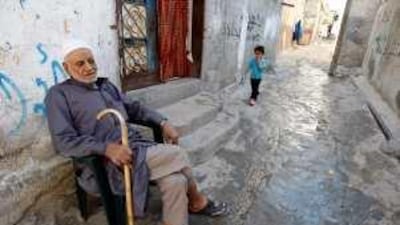GAZA CITY // On a recent hot, dry afternoon, Yasser Rihan, 30, was wrapping up the day's work on a construction site in the southern part of Gaza City. Mr Rihan was laying the foundation for a new orphanage, the kind of institution increasingly in demand in the battered Gaza Strip and the kind of construction that is now almost non-existent in the impoverished and isolated enclave.
The only reason this construction is going ahead, a "miracle", according to Mr Rihan, is that instead of relying on modern construction materials like cement, steel and glass, the orphanage is being built from mud bricks and usable rubble from the many destroyed buildings and houses in Gaza. "From nothing, we create something," said Mr Rihan, who used to work in a factory that made ordinary bricks, now long closed. His obvious pride in the ability of Gazans to cope aside, however, Mr Rihan said given a choice he would still prefer to build with modern materials.
"I have no experience of mud brick housing. But I can tell you that it takes longer." Of course, Mr Rihan, along with nearly 1.5 million other Gazans, has no choice. The Israeli sanctions on the Gaza Strip have seen crossings to the Palestinian enclave closed to anything but the absolute minimal emergency relief essentials such as food and medicine. Construction materials and other goods have been barred from entry for over two years.
Increasingly, however, international actors are beginning to up the pressure on Israel to ease the closure on Gaza. On Wednesday, more than 40 UN and other international NGOs again reiterated long-standing calls for an immediate end to the Israeli closure on the Gaza Strip, which was described as a "collective punishment". "We call for free and uninhibited access for all humanitarian assistance ? We also call for a return to normalised trade," said a joint statement read at a news conference in a UN warehouse in Jerusalem, where aid destined for the impoverished Palestinian enclave is stored.
The statement was signed by, among others, the UN agency for Palestinian refugees, UNRWA, Oxfam International and Care, as well as several dozen smaller organisations. More importantly, the United States is also increasing its pressure on Israel to ease the Gaza closure, according to a report on Thursday in the Haaretz newspaper, an Israeli daily. The United States is reported to want Israel to allow in construction materials as well as help breathe life into Gaza's economy by allowing for the import and export of commodities.
Crucially, Washington is reported as wanting Israel to delink the issue of Sgt Gilad Shalit, the Israeli soldier captured along the border with Gaza three years ago, from the issue of the crossings. Meanwhile, Hamas is also reported to be willing to lower its demands for a prisoner exchange deal for Sgt Shalit following a visit last week by the former US president, Jimmy Carter. Whether or not such US pressure, behind the scenes and still very much informal, will sway the hard-line Israeli government under Benjamin Netanyahu is another matter. In his much-publicised speech last week, Mr Netanyahu made no bones about his absolute rejection of dealing with Hamas, which Israel, as well as the United States, considers a terrorist organisation.
But the United States is acutely aware that to boost the domestic standing of Mahmoud Abbas, the Palestinian Authority president, the reconstruction of Gaza must begin, preferably under PA auspices. That, in turn, can only happen if Fatah and Hamas agree to a unity arrangement whereby the Fatah-led West Bank PA regains a foothold in Gaza. A unity government would also be a way for international actors to deal with the reality of the Gaza Strip without having necessarily to deal directly with Hamas. The US administration has accordingly made preparations for dealing with a Palestinian unity government, notably by asking the US Congress to approve continued aid to the Palestinian Authority even if Hamas joins in government.
The United States still wants Hamas to abide by the Quartet's conditions that it recognise Israel, renounce the armed resistance and abide by previously signed agreements, something the Islamist movement has so far refused to do. Nevertheless, Hamas has been increasingly eager to point out that in practice it is abiding by a ceasefire and that it would be willing to abide by previous agreements if Israel does the same, something that may be enough to persuade the United States to give it a go.
Evidence that Washington is now less opposed to Fatah and Hamas agreeing to a unity government came last week with the unexpected boost that Egyptian-mediated unity negotiations, long stalled, received when Hamas and Fatah members met both in Gaza and the West Bank and thrashed out their own prisoner-exchange deal, a long-time bone of contention between the two Palestinian factions. That deal has still to be implemented. Yesterday, the PA released 20 imprisoned Hamas members after Hamas had earlier criticised the West Bank leadership of not living up to its side of the bargain. Hamas criticised the release as "meaningless" and said in the week since the agreement had been struck, the PA had arrested more than 100 Hamas members.
Nevertheless, the agreement to release prisoners is an important confidence-building step that may indicate that unity talks, scheduled to conclude on July 7, could finally be gaining some traction. A successful conclusion to those talks will see international pressure on Israel to lift its closure on Gaza gain further traction. Until then, the labour-intensive and slow mud-brick industry in Gaza will remain the only potential form of reconstruction available to the tens of thousands of Gazans still homeless after Israel's onslaught on Gaza this year.
okarmi@thenational.ae

